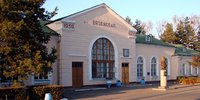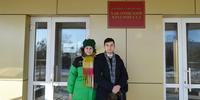Case of Baranov and Li in Vyazemskiy
Filter
- #
The Investigation Department of the FSB Directorate for the Khabarovsk Territory is initiating criminal case No. 12007080001000035 against Yen Sen Li and Yegor Baranov under Part 1.1 of Article 282.2 of the Criminal Code of the Russian Federation and No. 12007080001000037 under Part 1 of Article 282.2 of the Criminal Code of the Russian Federation.
- #
Criminal cases No. 12007080001000035 and No. 12007080001000037 are combined in one proceeding. The new case is assigned the number No. 12007080001000035.
Early in the morning, armed FSB officers aggressively invaded the home of 68-year-old Yen Sen Lee. An armed, masked operative hits Yen Sen in the side, wringing his hands and handcuffing him. From such inhuman treatment of an elderly man, his wife loses consciousness. The handcuffs of Yen Sen are removed only after the search. Then he is taken away for interrogation to the FSB in the Khabarovsk Territory, where they offer a deal with the investigation, involving self-incrimination. He was released home only at 9:00 p.m., after 13 hours of detention. A measure of restraint in the form of a written undertaking not to leave is chosen for the believer.
A search is also taking place at the home of 19-year-old Yegor Baranov, a student at a forestry technical school. He was detained for 48 hours.
Investigator S. V. Nemtsev interrogates Yen Sen Lee as an accused in the presence of lawyer V. V. Zhigalov and prosecutes him under two articles at once - "organization of the activities of an extremist organization" and "involvement of a person in the activities of an extremist organization" (respectively 282.2 (1) and 282.2 (1.1) of the Criminal Code of the Russian Federation).
According to the investigator's ruling, Yen Sen Lee quoted sources containing information that "incites religious discord" and, at the same time, "called for religious unity."
- #
The judge of the Khabarovsk City Court, Alexei Shatilov, makes a decision on the election of a preventive measure for Yegor Baranov in the form of detention for a period of 2 months, until July 26, 2020. The reason for the harsh decision regarding the only son of a single mother, according to the judge's wording, is that 19-year-old Yegor "has established stable religious views, is one of the leaders of this religious organization."
- #
The Khabarovsk Regional Court begins hearing on the appeal in the case of Yegor Baranov. The defense files a motion for the examination of witnesses. The court satisfies this petition and postpones the hearing for a day.
- #
Khabarovsk Regional Court (155 Pacificskaya Street). The decision to detain Yegor Baranov remains in force.
- #
It becomes known that the FSB investigator for the Khabarovsk Territory, Nemtsev S.V., achieved an unlawful ban on receiving and sending letters for Yegor Baranov, who is sitting in pre-trial detention center No. 1 in the Khabarovsk Territory. According to the law "On the detention of suspects and accused", they "are allowed to correspond with relatives and other persons without limiting the number of telegrams and letters received and sent." The defense believes that this is a way to influence the arrested person in order to force him to give the testimony necessary for the investigation, and will appeal the relevant decision.
- #
At 8:00 a.m., FSB officers with witnesses come to the home of a married couple of pensioners living in the city of Vyazemsky and present a decision to conduct a survey of the premises. Despite the coronavirus epidemic, those who come do not use masks, thereby endangering the elderly. From the stress received, the head of the family has a high blood pressure to a critical level. Frightened people are asked if they know Yen Sen Lee and Yegor Baranov, who had also been searched before.
At 12:00 p.m., security forces examine the home of a 64-year-old local resident. However, in fact, searches are carried out in the homes of believers, during which telephones, electronic devices, and various translations of the Bible are seized.
- #
Representatives of the juvenile division come to the witness in the case of Baranov and Lee and ask how well she takes care of her children. Earlier, an FSB officer threatened her with such a development of events. She worries about her health and the safety of the children she brings up alone. A day earlier, another witness in the same case had been searched.
- #
Judge of the Kirovsky District Court of Khabarovsk Yulia Yudakova extends the detention of Yegor Baranov until September 25 inclusive. The defense is appealing against this court ruling.
- #
The Central District Court of Khabarovsk satisfies the petition of the investigator of the investigative department of the FSB Directorate for the Khabarovsk Territory Nemtsev S.V. and seizes the 1998 Nissan car owned by Yen Sen Li. The believer plans to appeal against the judge's illegal ruling.
- #
Judge of the Kirovsky District Court of Khabarovsk Sergey Nakonechny extends Yegor Baranov's detention in the pre-trial detention center until November 25, 2020. During the hearing, he satisfies the motions of the defense and attaches to the case the opinions of the UN Working Group on Arbitrary Detention, as well as the letters and positive characteristics of the accused.
Investigator S. V. Nemtsev reports that by mid-September Baranov received 1269 letters. However, they are not handed over to the believer in connection with the imposed ban on correspondence, but are sent to the investigator for study.
- #
The Khabarovsk Regional Court partially satisfies the appeal of Yen Sen Lee, filed by him for the arrest of a personal vehicle. The appellate court clarifies that the accused is prohibited from disposing of the car (selling, etc.) until September 26, 2020.
- #
The judge of the Central District Court of Khabarovsk, Chizhova N.A., is considering a repeated petition of the investigator to seize Yen Sen Lee's car, in connection with the expiration of the previous restriction.
Despite the instructions of the higher court, the judge, without specifying the duration of the new ban, again seizes the car, prohibiting it from disposing of the vehicle.
- #
Investigator S. V. Nemtsev, on the basis of a court order dated 15.10.2020, draws up a protocol for the seizure of property. The vehicle remains in custody with the accused Yen Sen Lee.
- #
Despite the petition of the FSB investigator Nemtsev to extend the detention of Yegor Baranov, the Kirovsky District Court of Khabarovsk changes the measure of restraint for the believer. Instead of being held in custody, he was ordered to prohibit certain actions. Yegor Baranov spent 177 days in pre-trial detention. All this time, he did not have the opportunity to receive letters of support. Even before it became known about the intention of investigator Nemtsev to seize all incoming correspondence, in the first 10 days, 400 letters were addressed to Yegor Baranov in the pre-trial detention center. After 4 months, it became known that the number of letters had already reached 1200. Shortly before his release, Yegor Baranov received a box with 400 letters that he could read while at home. The rest of the letters are still being studied by the investigator, hoping to find grounds to attach them to the charge.

- #
The case goes to court for consideration by Judge Ksenia Matviyevskaya, prosecutor Natalia Ozhogina participates in the process. The hearing was postponed due to the absence of lawyer Yen Sen Lee.
According to the materials of the criminal case, Baranov professes a "manipulative creed," which consists in "replacing the state in the future with the kingdom of Jehovah." "Realizing his criminal intent," the indictment continues, "Baranov E. A. ... through the rite of baptism he became a member of the congregation in the city of Vyazemsky. At worship meetings, he "initiated ... reading prayers and singing songs," and "read, quoted, and used the religious edition of the Holy Scriptures."
- #
A judicial interrogation of the neighbors of the believer, in whose apartment the services were held, is underway. One of the neighbors indicates that she cannot fully confirm the written testimony drawn up earlier by the investigator.
The court interrogates a witness who once attended worship services. Despite the fact that she does not agree with the beliefs of Jehovah's Witnesses, the witness characterizes them positively. She also explains to the court that the religious meetings of Jehovah's Witnesses have a biblical basis.
- #
Interrogations of witnesses are ongoing. One of them declares that he has a negative attitude towards any religion. However, he has a positive characterization of Jehovah's Witnesses because they helped him get rid of foul language and smoking.
Another witness for the prosecution expresses an extremely negative attitude towards the doctrine of Jehovah's Witnesses and confirms that he is interested in stopping their activities. According to him, he works closely with the FSB.
When other witnesses are questioned, it is found that their written testimony is either wholly or partially untrue, it was compiled by the investigator. At the same time, they point to strong psychological pressure and threats from law enforcement officers.
- #
The key witness for the prosecution, Ekaterina Leichunas, is being questioned. She completely refutes the testimony signed during the preliminary investigation. According to her, she gave them under pressure: investigator Kuznetsov and FSB officer Alexei Svetachev threatened her with deprivation of parental rights.
Catherine points out that neither she nor the defendants had anything to do with the activities of the banned organization, but simply professed the religion of Jehovah's Witnesses together.
- #
At the initiative of the prosecutor, the court interrogates the FSB investigator Stanislav Kuznetsov, who conducted the investigative actions. He cannot explain why the testimony of witness Ekaterina Leičunas, which he compiled at different times, is absolutely identical, but at the same time contradicts the video recordings. He also claims that he conducted the interrogation alone.
A colleague of the investigator, FSB officer Andrei Kusov, is invited to the courtroom. He refutes the testimony of investigator Kuznetsov and states that in reality two people were present at the interrogation of Leichunas: Kuznetsov and the head of the FSB department, Alexei Svetachev. Kusov also explains that the investigation was carried out against Leichunas only because she professes the religion of Jehovah's Witnesses.
Witness Leičunas also adds that during the interrogation, investigator Kuznetsov raised his voice at her and held in front of her a piece of paper with ready-made answers that she had to read on camera.
- #
The court is questioning another prosecution witness. He speaks negatively about those who profess the religion of Jehovah's Witnesses. At the same time, he points out that Jehovah's Witnesses continue only those activities that are not related to legal entities. He also notes that the Supreme Court of the Russian Federation did not ban the religious activities of Jehovah's Witnesses.
- #
As a follow-up to the previous hearing, the court reads out the written testimony of the prosecution witness. He explains that the investigator changed the wording of his words during the interrogation. Therefore, it is not clear from the testimony whether the witness is referring to legal entities or to a religious organization in the cult sense.
- #
The court is questioning two more prosecution witnesses. One of them enjoys the right not to testify against himself, and also refuses to testify earlier. Another states that he did not sign the interrogation protocol due to distortion of facts, and some of the signatures in the document and the phrase "from my words it is written correctly" do not belong to him.
- #
A study of the audio recordings attached to the case is underway.
In the presence of witness Ilya Degtyarenko , the video recording of his interrogation during the preliminary investigation is examined. He refutes the testimony, pointing to the threats and strong psychological pressure exerted on him by the FSB officer and the investigator.
- #
The court examines a number of passages from the Bible on how to build relationships with others, strengthen the family and show respect for the authorities.
A homemade board game on a biblical theme seized during the search is being investigated. The defense petitions that at the next court hearing all together play this game to establish whether it incites hatred and enmity.
The court does not satisfy this request.
- #
Interrogation of religious scholar Olga Averina is underway. The specialist reports that she did not participate in the inspection of the objects and documents of the case, but simply put her signatures in the protocols.
- #
The court interrogates psychologist E. Bessonova and linguist E. Kradozhen-Mazurov, who conducted the examination.
From their speech, it becomes obvious that someone after the fact changed the expert opinion, which is already among the case materials. The judge attached to the case only an excerpt from the original version of the conclusion, which the experts brought with them to the court, but did not exclude the false text from the case.
- #
The secret witness "Petrov I.S." is being interrogated. Yen Sen Lee confidently declares that this secret witness is Alexei Bessonov, who is familiar to him. In his testimony, the witness voices the untrue assumption that all those who profess the religion of Jehovah's Witnesses are part of a legal entity (the Administrative Center and the LRO). At the same time, he recognizes the difference between a worship service and a meeting of representatives of a legal entity. At the same time, the witness voices the delusion that the Supreme Court forbade Jehovah's Witnesses to read the Bible, pray, sing religious songs, and talk about God and his commandments. Although the Russian authorities and the Plenum of the Supreme Court explained that Jehovah's Witnesses are not forbidden to practice their religion personally and jointly.
During the interrogation, "Petrov" repeatedly takes long pauses to think about the answers. Once in the room where he is located, an extraneous voice is heard. The court does not answer the question of the defense whether the witness is alone in the room.
- #
It becomes known that at about 11:00 Yen Sen Lee died in the hospital from COVID-19, and did not have time to restore his good name. He would have turned 70 in March.
- #
The criminal proceedings against Yen Sen Lee in connection with the death of the believer are terminated.
- #
Over the course of three sessions, the court examines the audio recordings attached to the case. The testimony of the deceased Yen Sen Lee is announced.
- #
The defense asks the judge to exclude inadmissible evidence and challenges the judge. The court rejects both requests.
- #
The prosecutor requests for Yegor Baranov 6 years in a general regime colony and a year and a half of restriction of freedom.
- #
Judge Ksenia Matviyevskaya sentences Yegor Baranov and sentences him to 5 years of suspended imprisonment.
- #
The case goes to the Vyazemsky District Court of the Khabarovsk Territory for reconsideration. Judge Tatyana Chistova.
- #



